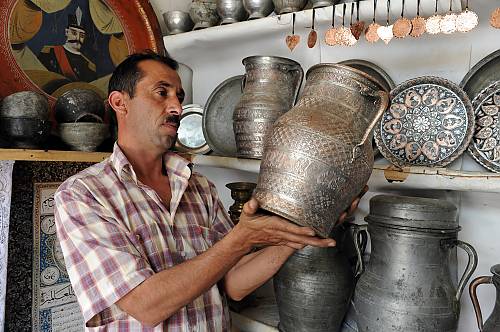Planning a trip to Baku? Here are 5 unique things to buy in Azerbaijan—including cultural souvenirs, local crafts, and famous treats you won’t find elsewhere.
Not every souvenir has to be a keychain. Sometimes, the real memory of a place hides in a scent. A texture. A taste you can’t describe but instantly recognize the next time you find it. And when it comes to Azerbaijan, the capital city of Baku doesn’t just sell things—it gives you stories to carry home.
So if you’re wondering about the famous things in Azerbaijan to bring back—or the things to buy in Azerbaijan that are worth packing your suitcase a little tighter, this list might help. It isn’t just about what’s beautiful. It’s about what stays with you.
Azeri Carpets: Woven Stories from the Caucasus
You don’t buy a carpet in Azerbaijan. You inherit one. That’s how it feels when you walk into a workshop in Baku’s old city and see the quiet rhythm of a weaver at work. The colors are deep—indigo, rust, gold. The patterns? Centuries old, passed down like lullabies. Azerbaijani carpets aren’t just beautiful. They’re symbolic. Each region: Quba, Shirvan, Ganja, has its own style. Some geometric. Some floral. Some that seem to whisper something older than language. You’ll find both antique and modern versions. And yes, they can ship them home.
Pro tip: Always ask the weaver about the meaning of the pattern. You won’t forget it.

Armudu Glasses: Tea, but Make It Azeri
They don’t drink tea from mugs here. They drink it from armudu glasses—curved like a pear, designed to keep the top of the tea hot and the bottom cool.
You’ll see them everywhere, in homes, in roadside teahouses, in five-star hotel lobbies. Bringing a set home is like bringing a piece of Azerbaijani rhythm with you. Even when you’re back at your kitchen table, it makes tea feel like a ritual again. Some sets are plain. Others come etched with gold and traditional patterns. Most are lightweight, easy to pack, and uniquely Baku famous things to buy for both beauty and use.

Azerbaijani Saffron: A Spice Worth More Than Gold
In local markets like Yashil Bazaar, you’ll smell it before you see it—that warm, earthy, almost honeyed scent of Azerbaijani saffron. This isn’t just a kitchen souvenir. It’s a luxury, used in everything from pilaf to tea. And the quality? Some say it’s on par with Iran’s best.
The saffron strands sold in Baku are often fresher, unadulterated, and packaged in elegant jars or glass vials. Perfect as a gift. Even better if you cook.
Travel note: Some vendors may mix cheaper saffron in. Buy from trusted stores or local women-run stalls who take pride in their product.

Caviar: The Fancy Take-Home Snack
When I discovered I could legally buy Caspian Sea caviar in Baku, I felt like I’d unlocked a luxury travel achievement. Azerbaijan is famous for its black caviar, sourced from sturgeon in the Caspian Sea. A small tin of Osetra caviar cost me nearly as much as my hotel stay, but let’s be honest—it was worth it. If you’re bringing caviar home, keep it chilled and remember: you can only take 125g per person through customs.
Historically, Azerbaijan was one of the key exporters of sturgeon caviar. Today, you’ll find both traditional and farm-raised varieties in gourmet stores across Baku. Yes, it’s a luxury. But it’s also a taste that represents the region’s relationship with the Caspian—one of richness, tradition, and resource. Just make sure you check customs rules before carrying it home. Some countries restrict bringing back animal-based food items.

Sheki Sweets: Halva, Pakhlava & Sweet Memories
If you’re looking for famous things in Azerbaijan that don’t just look good but taste unforgettable, head toward the sweets. Sheki halva, a flaky, syrupy pastry with layers of nuts and spices, is iconic. It crumbles in the mouth and leaves behind a trail of rosewater and memory. You’ll also find pakhlava—similar to baklava but richer, often diamond-shaped and topped with clove or almond. And then there are fruit leathers, walnut-stuffed dried fruits, and local jams made from cherry, quince, or even eggplant. These make excellent edible gifts. Just be sure to carry them home in a well-sealed box—or you might eat them all at the airport.

Pomegranate Wine & Azerbaijani Sweets: A Tasty Souvenir
If you’re thinking about things to buy in Azerbaijan, pomegranate wine should be high on your list. Azerbaijan is obsessed with pomegranates, and after trying their wine, I get it. Sweet, tart, and full of antioxidants (so basically, it’s healthy, right?), this wine is a must-buy. The best place to grab a bottle? Yashil Bazaar. While you’re there, don’t miss out on other local treats like pakhlava (Azerbaijan’s version of baklava) and shekerbura, a nut-filled pastry traditionally made during Novruz.

Lahij Copperware & Handmade Jewelry: Small But Mighty Finds
If your suitcase doesn’t have room for a carpet, consider a piece of Lahij copperware instead. This mountain village is famous for its finely engraved copper pots, plates, and pitchers—perfect for adding a touch of Azerbaijani craftsmanship to your home. I snagged a hammered copper bowl that now serves as my go-to snack dish. Also worth checking out? Handmade jewelry featuring silver filigree, traditional buta motifs, and even miniature pomegranates. You’ll find these treasures in Baku’s Old City or the handicraft markets in Lahij, it should be in your list of things to buy in Azerbaijan

Kelaghayi: More Than Just a Scarf
At first, it looks like just another piece of cloth. But ask someone in Baku what a kelaghayi means to them, and you’ll get stories—not sales pitches. These silk scarves are dyed by hand in places like Sheki. The colors? Deep and deliberate. The patterns? Not random. They often carry meaning—seasons, strength, blessings. For many women, a kelaghayi isn’t bought. It’s given. In weddings. In farewells. In quiet gestures between generations. Bring one back if you want to carry something soft but also strong.
Where to Find the Good Stuff Without the Guesswork
If you’re short on time—or patience for bargaining, here’s where I’d go again:
- Old City (Icherisheher): For carpets, copper, and classic souvenirs
- Yashil Bazaar: Spices, saffron, sweets, and little jars of pomegranate molasses
- Taza Bazaar: More local, less polished, but full of heart
- Nizami Street: Trendier shops—scarves, perfumes, and hand-painted ceramics
I found the best stuff when I wasn’t really looking. Maybe you will too.
Final Thoughts
Azerbaijan doesn’t give you mass-produced memory. It gives you detail. Craft. Story. Whether it’s a handwoven carpet or a pomegranate-scented oil, the things to buy in Azerbaijan reflect how much care this country puts into tradition. Into memory. Into sharing a part of itself with the people who come through. So don’t just grab the easiest thing on a shelf. Look a little closer. Ask a few questions. Let the souvenir find you. And when you’re home—days, months, maybe years later—you’ll be glad you packed more than just your clothes.
And if you’re looking to plan your holiday, check out our curated Azerbaijan holiday packages for a journey full of memories.
FAQs
Q: What’s one thing I have to buy in Baku?
A: Honestly? A carpet. Even if it’s a small one. Or a kelaghayi scarf if you prefer something lighter. There’s history woven into both. If you’re into food, try the pomegranate wine—it’s oddly memorable.
Q: What are the most popular things to buy in Azerbaijan for tourists?
A: Traditional Azerbaijani carpets, Kelagayi silk scarves, Caspian Sea caviar, pomegranate wine, and handmade copperware are among the top picks for travelers visiting Azerbaijan
Q: What do most tourists bring back?
A: You’ll see a lot of people picking up copper pots, scarves, tea sets, or little jars of saffron. Sweet stuff from Sheki too. Oh—and everyone seems to leave with some kind of carpet story.
Q: Where do I buy real Azerbaijani carpets?
A: Try the Carpet Museum shop or one of the tucked-away places in Icherisheher. Ask questions. Sit down. They’ll make you tea and explain the patterns if you’re lucky.
Q: Can I take caviar home?
A: Yes—but not a whole suitcase full. Usually 125 grams per person without a permit. Always double-check your country’s customs rules.
Q: I’ve only got a few hours in Baku. Where should I shop?
A: Start at Yashil Bazaar for spices and sweets. Then head into the Old City for handicrafts. If you want something more modern, Nizami Street has it all. But don’t rush—sometimes the best finds are unplanned.
Q: Is it all expensive?
A: Not really. Caviar and carpets? Yes. But soaps, tea, scarves—you’ll find beautiful things even with a modest budget.
Q: Are Azerbaijani carpets super pricey?
A: They can be. Small handwoven pieces might start around $100. Big antique ones can run into the thousands. If you’re serious, go to a certified shop and ask for documentation.
Q: What about jewelry?
A: Some pieces are stunning—especially silver filigree from Lahij. If you like traditional designs, definitely take a look. Just compare prices before buying.
Q: How do I know it’s real?
A: Ask. Always ask. Real shops will give you a certificate—especially for carpets and caviar. If someone seems pushy or vague, walk away.
Q: Any off-the-beaten-path places to shop?
A: If you can get out of Baku, Sheki is a dream for sweets and silk. And Lahij has the kind of metalwork and wood carving that feels like it belongs in a museum, but you can actually take it home.


Very informative, detailed and helpful information.